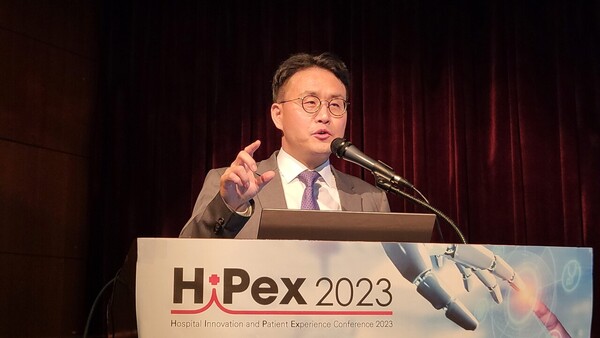
There are many practices to care for patients before and after surgical operations. Some of them are fasting for eight hours before surgery, not eating until after farting, and requiring spine surgery patients to lie down for six to eight hours after surgery.
However, this perioperative patient cares have no scientific grounds, according to an expert.
Dr. Lee Kyoung-hak, head of the Orthopedic Department at National Medical Center, said so in the HiPex 2023 (Hospital Innovation and Patient Experience Conference 2023) at Myongji Hospital in Goyang, Gyeonggi Province on Thursday. He delivered a lecture titled “Seven ways to reduce postoperative complications: focusing on ERAS Protocols.”
Stressing the need to adopt and practice "Enhanced Recovery After Surgery (ERAS)” protocols, Lee pointed out that would lead to a win-win situation, as it improves patient safety and reduces the workload for doctors and nurses.
“The management of postoperative complications as we know it, such as pre- and postoperative fasting, is a 'superstition' toxic for patients," he said., emphasizing there are other, more appropriate methods to manage patients.
He explained that implementing the ERAS protocol after surgery can positively affect the patient's metabolism and immunity after surgery.
While the standard preoperative fast is eight hours, numerous studies have shown that it is possible to eat six hours before operations and drink water two hours before, Lee said, pointing out that the "eight-hour fast" believed by the medical establishment is a myth.
Regarding postoperative eating, he said that people usually don't give water until they have a bowel movement or fart, but this is also a myth. It has been shown that getting patients to eat as soon as possible after surgery has a more positive outcome.
Instead, he noted that if the food doesn't make it to the intestines for a long time after surgery, blood flow to the intestines decreases and becomes less functional, leading to bad outcomes, such as bacteria traveling in the bloodstream.
He also explained that it is important to feed and remove IV fluids as soon as possible after surgery, and patients don’t need to wear drains after surgery.
“If these tubes are not for draining urine or similar things but for draining blood, you don't have to wear them. If you don't use a drain, you can prevent a lot of situations where (the drain) comes out on its own on the ward, and it also reduces the workload for (nurses and doctors),” Dr. Lee said.
In particular, it is necessary to remove fluids and drainage tubes so patients can walk early after surgery, Lee added.
"After surgery, patients must walk early. It is essential to remove devices that obstruct their walk,” he said. “It is common knowledge that spinal anesthesia patients should lie down for six to eight hours after surgery, but this is not true. Some reports lying down can cause headaches.”
Lee noted that even at the National Medical Center, there were fears (about allowing spinal anesthesia patients to walk quickly after surgery). Still, there have been no problems (due to doing so). He explained that the Gerontological Society of America (GSA) and other associations have already published papers showing no problems.
“When patients move from the operating room to the wardroom, medical workers say, 'Get some rest.' However, the rest makes them worse," he says. “There's a poem from 1942 that says, 'The blood curdles, the bone marrow oozes, the crippling shit piles up, the bladder counts, the spirit flees from the mind.' (If you keep a surgical patient lying there) you're doing worse than people did 80 years ago.”
Lee also called for a preoperative warm-up to maintain body temperature before and after surgery, minimizing blood transfusions and postoperative antibiotics, and administering oxygen only if necessary.
Regarding postoperative injection of antibiotics, Lee said, "In university hospitals, it's usually five days after surgery, and in community hospitals, it's seven days. A look at the guidelines for antibiotic administration shows one dose is appropriate based on 24 hours before and after surgery. It is overused in Korea."
Lee went on to say, “If you look at the papers that examined the results of ERAS implementation, most of them show similar effects, such as a 30-50 percent reduction in length of hospital stay, he said. In the field, you can see a ward change from a noisy marketplace to a land of morning calm.”
However, the orthopedic specialist cautioned that implementing one or two of the ERAS protocols won't make a difference, emphasizing medical workers must follow at least 80 percent of the protocols to make a difference."
"ERAS requires no AI, no robots, no money, and no time but just a change of mindset to reduce staff workload and benefit patients,” he said. “It's a win-win for patients and staff if you use it starting today."

